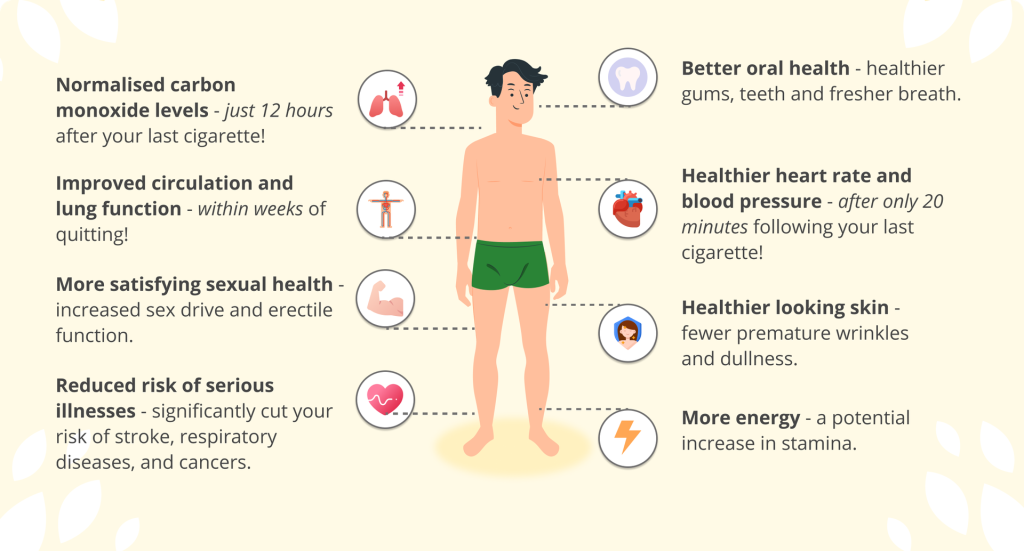If you’re reading this, you might be considering the idea of quitting smoking – or maybe you’ve already made the leap. First off, let me just say: that’s fantastic!
Whether you’re at the starting line or already on your journey, let’s explore the amazing benefits of living smoke-free.
While the journey isn’t always easy, every step forward is a step toward a healthier, smoke-free life. Here we cover the many ways quitting smoking can positively impact your body, mind, relationships, and finances.
Physical health benefits: Your body starts to heal
One of the most encouraging things about quitting smoking is how quickly your body begins to recover:
- 20 minutes after your last cigarette, your heart rate and blood pressure begin to drop
- 12 hours later, carbon monoxide levels in your blood return to normal
- Within weeks, your circulation and lung function improve, making activities like climbing stairs easier
- After a year, your risk of a heart attack is half that of a smoker’s
- Within 10 years, your risk of death from lung cancer is significantly lower
- After 15 years, your risk of heart attack falls to the same as someone who has never smoked

Beyond these milestones, quitting smoking reduces your risk of stroke, respiratory diseases, and multiple types of cancer. It also benefits your immune system, making you less prone to illness. You may even experience a boost in energy levels.
Imagine living a longer, healthier life free from the shadow of smoking – wouldn’t you want to celebrate those milestones like birthdays, anniversaries, or just a sunny Saturday without worry?
Another often-overlooked benefit? Better oral health. Smoking can cause gum disease, tooth loss, and staining. Within months of quitting, your gums will be healthier, your teeth will look better, and your breath will be fresher.
Healthier skin is another visual benefit to quitting. This is because smoking can impact how quickly you appear to age by disrupting collagen production – that all important protein that supports skin strength and elasticity. As well as premature wrinkling and facial ageing, smoking can also be responsible for making skin looking dull and grey, as it can reduce blood flow to your skin, meaning fewer nutrients and less oxygen are delivered to it.
What’s more, as a smoker, you’re 2-3 times more likely to develop psoriasis, a chronic inflammatory skin condition which can be very uncomfortable and disfiguring – yet another reason to give up!
Sexual health: perform better
Research has found that cigarette smoking is linked to worse sexual health, such as a lower libido (or sex drive, compared to non-smokers. The good news is, former male smokers had better erectile function and sex drive than current smokers. So, quitting smoking may improve your sexual health.
Mental health: Less anxiety, more control

Smoking is often used as a stress reliever, but have you considered how quitting could actually lead to less anxiety in the long run?
Research shows that, over time, ex-smokers often report:
- Improved mood
- Lower levels of stress
Isn’t it fascinating to think that breaking free from nicotine dependence can lead to a greater sense of control over your life?
The NHS highlights that quitting smoking can reduce the risk of depression and anxiety. Think about it: have you ever felt foggy-headed or irritable after a smoke? Imagine experiencing clearer thinking and sharper focus. What dreams or goals could you pursue with a clearer mind?
If you’re worried about managing stress without cigarettes, there are many healthy alternatives, from exercise to mindfulness techniques. The key is finding what works for you.
Social benefits: Connecting without smoke

Smoking can sometimes create a barrier between you and others, especially in smoke-free environments.
Have you ever missed out on a special moment because you felt like you had to step outside for a cigarette? Quitting can open up new social opportunities and strengthen your connections. You might find yourself engaging more deeply with friends, family, and even new acquaintances:
- No more missing out on in-jokes and conversations to take a smoke break
- Greater confidence in social and professional settings
- No need to stand outside in the cold and wet weather
- A fresher scent – no more smoke clinging to clothes, hair, or your home
If you have children, quitting also means setting a healthier example. Studies show that kids whose parents smoke are more likely to pick up the habit. By quitting, you can positively influence younger family members and protect their health from second-hand smoke.
Speaking of loved ones, if you ever smoked near them, they could have been breathing in your smoke, as most of it doesn’t actually go into your lungs, but into the air around you, and even lingers on your clothing. People who breathe in secondhand smoke regularly have higher chances of getting the same diseases as smokers, including lung cancer and heart disease. Children who live in a smoky house also have a higher risk of breathing problems, asthma and allergies.
Quitting means your loved ones and those around you are no longer exposed to your second-hand smoke, protecting them from the things outlined above.
Financial freedom: How much could you save?

Smoking can be a pretty expensive habit. Have you calculated how much you spend on cigarettes each month?
Consider this: If you smoke a pack a day, you could save over £4,000 per year by quitting. That’s money you could put toward a holiday, savings, or something you’ve always wanted.
Take a moment to think – what would you do with that extra cash?
You can calculate how much money you could save based on your own cigarette usage with this online calculator.
Better for the environment: Less cigarette butts littering outside spaces
Perhaps you don’t litter but did you know that cigarette butts actually contain mainly plastic (cellulose acetate), which, although small and often unnoticeable, can take up to a decade to degrade? The toxic chemicals such as arsenic, lead and nicotine in cigarette butts linger around for even longer.
With cigarette butts being the most common form of plastic waste pollution globally, by quitting smoking you’d be doing the environment a lot of favours.
Regaining your senses: Taste, smell, and more

Within days, your sense of taste and smell will improve, making food more enjoyable. Have you ever bitten into a delicious meal and thought, “Wow, I really can’t taste this as well as I used to?”
Imagine fully enjoying the flavours of your favourite meal, or breathing in fresh air without the dulling effects of smoking. These small but meaningful changes can bring new appreciation to everyday experiences.
Breaking free: A journey worth taking
I want to remind you that every step toward quitting is a victory.
Whether you’re just thinking about it or actively working on your plan, you’re taking charge of your life.
What small change can you make today that will bring you closer to your goal? Perhaps it’s seeking support from friends, joining a quit smoking group, or talking with your healthcare provider about options.
Remember, the journey to quitting smoking is unique for everyone, and it’s okay to take it one day at a time. Reflect on the benefits we’ve discussed here: your physical health, mental clarity, social connections, and financial freedom. Which of these resonates most with you? How can these benefits motivate you to take the next step?
Quitting smoking isn’t just about giving something up; it’s about embracing a vibrant, smoke-free life filled with possibilities.
You’ve got this!

If you haven’t already, why not download the Evergreen Life app to continue taking steps towards a healthy lifestyle?
- ash (2022) How Smoking Affects the Way You Look. [online] Available here.
- Earthday.org (2024) Tiny But Deadly: Your Buss on Plastic. [online] Available here.
- Hammer TR, Fischer K, Mueller M, et al. (2011) Effects of cigarette smoke residues from textiles on fibroblasts, neurocytes and zebrafish embryos and nicotine permeation through human skin. International Journal of Hygiene and Environmental Health. 214(5): 384-391 (doi: 10.1016/j.ijheh.2011.04.007).
- Make Smoking History (n.d.) Saving money. [online] Available here.
- Mima M, Huang JB, Andriole GL, et al. (2022) The impact of smoking on sexual function. BJU Int. 130(2): 186-192 (doi: 10.1111/bju.15711).
- NHS Better Health (n.d.) Benefits of quitting smoking. [online] Available here.
- NHS Better Health (n.d.) Quit smoking. [online] Available here.
- NHS Inform (2025) Benefits of stopping smoking. [online] Available here.
- NHS (2022) Passive smoking. [online] Available here.
- Vakharia K and Davis A (2024) Smoking effects on skin: from ageing to illness. [online] Available here.
- Yazdanparast T, Hassanzadeh H, Nasrollahi SA, et al. (2019) Cigarettes Smoking and Skin: A Comparison Study of the Biophysical Properties of Skin in Smokers and Non-Smokers. Tanaffos 18(2): 163-168 (PMID: 32440305; PMCID: PMC7230126).





